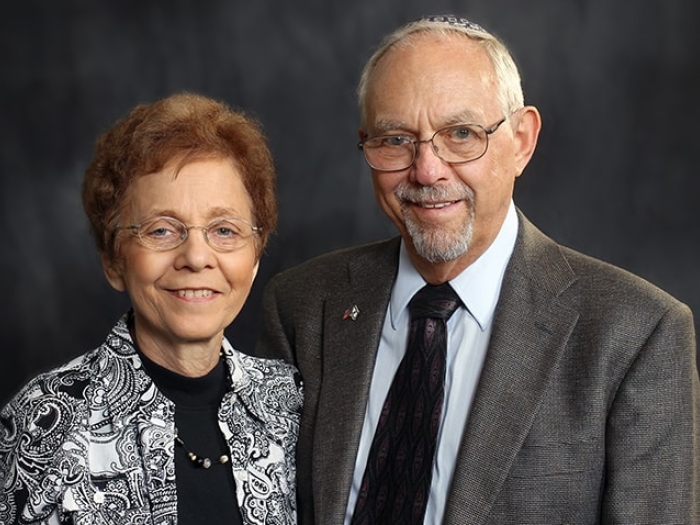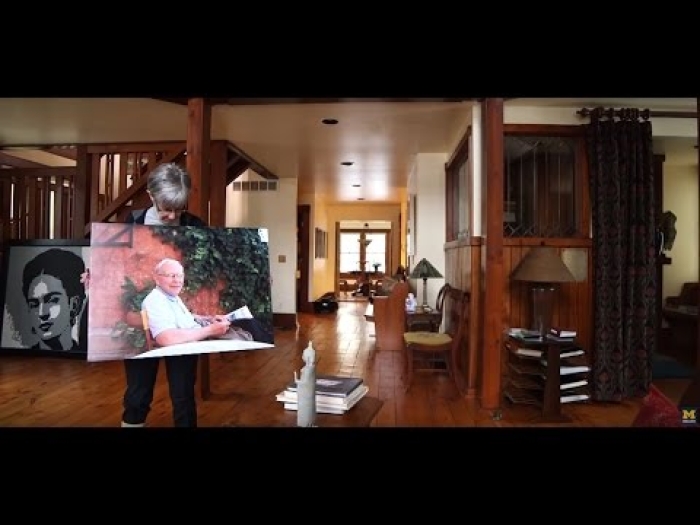Caring for a loved one with Lewy body dementia can be challenging. A U-M employee offers strategies based on her family’s experience.
7:00 AM
Author |

As the communications manager for the Carl Rinne Lewy Body Dementia Initiative at the University of Michigan, you might expect that I know something about this relatively common form of dementia. And I do. But it's not because it's my job to educate the public and health care professionals about Lewy body dementia (LBD).
SEE ALSO: 5 Strategies to Help Caregivers Practice Self Care
I know about it because I "lived" LBD.
My father had LBD. With help from my siblings, I managed his care for six years.

Accounting for up to 20 percent of cases, Lewy body dementia is the third most common form of dementia. Doctors are learning more about what causes LBD, but overlapping symptoms often make it difficult to diagnose. Its fluctuating symptoms can make it difficult to care for someone with LBD.
SEE ALSO: Capgras Syndrome: Are You the 'Real Mary'?
Here are a few ways my family learned to cope and provide the best care possible for my dad:
Be inclusive: Include your loved one in family activities whenever possible. We took dad to church every week, and we included him in just about everything, such as outings to restaurants and movies. As the disease progressed, and his participation in the conversation decreased, he still enjoyed being with us and hearing about our lives. The outings gave him a lot of pleasure and purpose.
Be an advocate: I credit much of my dad's good care to his team at the Turner Geriatric Center at U-M. However, one of his doctors told me that it was my efforts and advocacy for him that was key. Before each appointment, I would write an email to the doctor to share my observations and concerns (which I confirmed with my brother) so that I didn't have to mention them in front of my dad. This would be even easier today with U-M's Patient Portal.
Be sympathetic: Once we had the LBD diagnosis, "Lewy" almost became a person. When dad would hallucinate that there were children in the room, we would say, "Those are your Lewy kids." Or when he would get frustrated and upset, we might say, "It's Lewy's fault" or "Blame it on Lewy." This would usually help us get through the situation.
Be responsive: Play along when it is safe to. When dad would call us from his assisted living facility and say that he was at a hotel and couldn't find his way back home, we would work within his "reality" and suggest he find a "hotel worker" and ask them to take him to his room.
Be watchful: A dramatic cognitive change is frequently a warning sign that something else is going on, such as a urinary tract or respiratory infection.
Understand that every time your loved ones get sick, it may impact them cognitively. They may drop down a level or two. Sometimes your loved ones might bounce back to previous cognition levels, or this becomes a new level, or they end up somewhere in between.
Be present: If they ask, let them know that you're "really you." (Capgras Syndrome is common in people with LBD.) Mention things you did together, a song you sang, a television program you enjoyed. While there are times that will be tough to handle, the LBD journey can still be filled with love and laughter. My dad still had a twinkle in his eye and kidded around and teased health care workers up to his final days.
Be receptive: Knowledge is power. The Ann Arbor Area LBD Support Group (a U-M Rinne LBD Initiative group) for caregivers and family members of those diagnosed with Lewy body dementia meets on the second Tuesday of each month from 2 to 3:30 p.m. There is also a separate meeting for those who have an early diagnosis of LBD. For more information, call Renee Gadwa, education and outreach coordinator for the Michigan Alzheimer's Disease Center at U-M, at 734-764-5137.

Explore a variety of health care news & stories by visiting the Health Lab home page for more articles.

Department of Communication at Michigan Medicine
Want top health & research news weekly? Sign up for Health Lab’s newsletters today!





